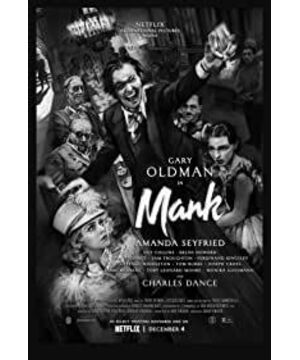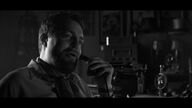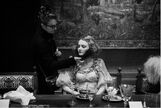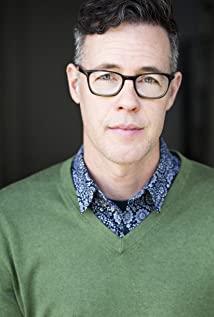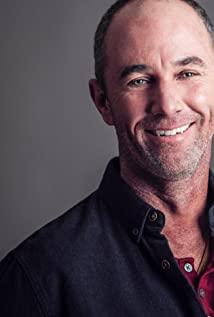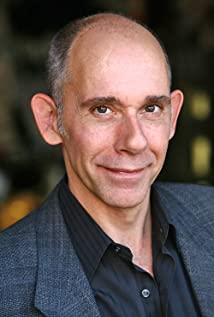"Mank" is a Netflix drama about the production process of "Citizen Kane". The characters are based on Hollywood screenwriters and studio executives. The following is their true appearance.
Author: Nicolas Rapold
Source: The New York Times
December 4, 2020
Although the title is just a name, David Fincher's "Mank" includes a lot of figures from the golden age of Hollywood. This drama that goes deep behind the scenes in Hollywood is set in the 1930s and 1940s, and tells the story of Herman J. Mankiewicz (Gary Oldman) creating "Citizen Kane".
This task was a big breakthrough for Mankiewicz, and the screenwriter and director Orson Wells (played by Tom Burke in the film) also turned into a filmmaker by virtue of the artistry of his film debut The first echelon. As the "Times" praised "Citizen Kane" when it premiered in 1941. "It's almost the most sensational movie in Hollywood history"
"Mank" connects "Citizen Kane" with its Hollywood and political inspirations. The flashback traces the pace of the arrogant writer gathering in the studio’s writing room and media mogul William Randolph Hirst’s estate.
Mankiewicz is an alcoholic immigrant from New York. He was a journalist and a member of the Algonquin Roundtable, but he was active in the social circle of the studio, exchanging with screenwriters, producers and executives. Opinions and gambling debts. Hearst and his mistress and actress Marion Davis also enjoyed the sharp company of Mankiewicz, but the wealth and influence of this multi-millionaire gave the author's creative inspiration in his mind, and the friendship was there. Bathe.
The story in "Mank" is like this, and it also adds some key political background: the historic California governor's election in 1934, involving the socialist writer Upton Sinclair. Here are some real characters in the film:
William Randolph Hirst
Hearst (Charles Dans) transformed the family's mining industry into a media empire spanning the United States. By the beginning of the 20th century, his popular newspaper was known for its pornographic news (not pornographic reports, referring to exaggerated and sensational reports), which influenced world events such as the Spanish and American wars. Hirst also participated in the race to represent New York State in Congress, but failed in the race for the mayor, governor, and Democratic presidential nomination of New York. The rise and fall of loneliness of Charles Foster Kane played by Wells in "Citizen Kane" draws on Hirst's story of great ambition and wealth, including his manor in San Simeon, California— -This is a key location in "Mank". When Raidenhua tried to release "Citizen Kane," Hirst (he had turned to a more conservative view at the time), with the help of his agents, launched a brutal campaign to thwart its widespread distribution.
Marion Davis
Davis (played by Amanda Seyfried) is still little known, and she has always been considered the prototype of Charles Foster Kane's second wife in "Citizen Kane". In fact, Davis is a fascinating comedian (there are "The Actress's Life" and "Little Cutie"). She is keen on social activities. Although Hirst supports her financially through his news empire, he is stubborn. I really want her to star in a serious drama. Davis chose to retire in 1937 (at the age of 40), and soon helped each other when Hirst's wealth fell. The two remained together until Hirst's death in 1951. The relationship between Davis and Mankiewicz was very pleasant, and the friendship between the two was not destroyed because of "Citizen Kane".
John Hausman
In New York, Hausman (played by Sam Troughton) once staged Wells' creative work as part of the Federal Theater Project. Later the two co-founded the Mercury Theater. Hausmann was commissioned to be the editor of Mankiewicz for the radio program of the Mercury Theater. In “Mank”, Hausman and Wells cooperated to provide shelter and supplies for Mankiewicz’s creation of “Citizen Kane” . As a result, Hausman became a star witness in the decades-long script credit tug of war. Both Mankiewicz and Wells won Oscars for "Citizen Kane". After cooperating with Wells, Hausmann produced films of Nicholas Ray, Vincent Minnelli and Joseph L. Mankiewicz (Herman's younger brother). Later, Hausmann gained a new reputation for acting. He played a law school professor in the 1973 TV series "Striving for the Top" and won his own Oscar for supporting actor. He also played in the subsequent adaptation of the TV series. This role. (Yes, he is the man in the Smith Barney ad that praises the old-fashioned way of making money).
Louis B. Meyer
Meyer (Alice Howard) ruled MGM in an era of ruthless studio leaders. Starting from a humble playground, Meyer helped Hollywood create a golden age, with stars such as Greta Garbo and Clark Gable, as well as classic works such as "The Wizard of Oz" and "Song in the Rain." Mankiewicz joined MGM as a screenwriter, but lost the job because he failed to quit gambling. It is said that he raised his head when placing a bet ahead of him in a gambling and stared at his soon-to-be former boss. In "Mank", the awe-inspiring MGM head plays a benevolent veteran to his thousands of employees, and he played a role in Hirst and Frank Merian (1934 Republican governor candidate, opposed Upton Sinclair) put his support behind. Meyer from a Ukrainian immigrant family grandly declared that July 4 (US National Day) was his birthday. This detail is included in "Mank".
Ben Hutt
Hutt (played by Jeff Harms) wrote the scripts for "Beauty" and "Scarface", and co-wrote the script "Man City Storm" (and many more including "Girlfriend Friday" Adapted works). Hutt came from the New York social circle where Mankiewicz once frequented. Mankiewicz sent a telegram to his friend and sent out an often quoted Hollywood invitation: "There are millions of dollars waiting for people to grab. And your only competitor is a bunch of idiots." In a group scene in "Mank", Hutt and Mankiewicz joined a screenwriting conference composed of contract writers: Broadway comedy genius George S. Kauf Man, the humorist S.J. Perelman, and two Hutt’s collaborators, his co-writer Charles MacArthur and the young Charles Ludler, Marion Davis Nephew. This group of people offered ideas and suggestions to Paramount producers David O. Selznik and "Joe" von Sternberg-Ben Hurt created the pioneering gang story "Underworld" for him director.
Joseph L. Mankiewicz
Joseph Mankiewicz (played by Tom Perfi) directed "Comet Beauty", "Barefoot Angels" and "Cleopatra", as well as countless other screenwriters or producers (including "Philadelphia Story"). He also happens to be the younger brother of Herman. Although Herman helped him start in Hollywood, it was Joseph who gained a greater and more stable reputation in the starry sky of Hollywood. He later won four Oscars-two directors and screenwriters for "Three Wife Amorous History" and "Comet Beauty". However, the Mankiewicz brothers have a common growth experience. Their father Franz is a professor at Columbia University and a strict father.
Irving G. Thalberg
Talberg (played by Ferdinand Kingsley) co-founded MGM with Louis Meyer at the age of 24 (operating Universal Pictures at the age of 20). He is aptly called Hollywood's "boy's miracle" and died young in 1936. He has produced hundreds of films and achieved admirable success. In "Mank," he wielded power with Meyer and coldly tried to force Mankiewicz to align with the film company's support for Merian's campaign for governor, and the writer resisted this effort. Talberg did make a fake news film, claiming to portray the image of an ordinary person against Merian’s socialist opponent, Upton Sinclair. Oscar fans know that the Academy later established the "Owen G. Talberg Memorial Award" to recognize filmmakers who later performed outstandingly.
Upton Sinclair
Sinclair (Bill Nye) is the author of the famous meat packaging disclosure book "The Slaughterhouse." (His book "Petroleum" was adapted into the movie "Black Gold Enterprise"). In addition, Sinclair is also running for governor, campaigning on his "End California Poverty" platform, and his suggestions include establishing a network of cooperatives. After failing to warm up for elections in 1926 and 1930, the best-selling author won more than 800,000 votes in his third attempt in 1934 to advocate for socialist policies in a state struggling from the Great Depression. In the end he lost to Merian, who was helped in part by a negative campaign coordinated by Mayer. "Mank" focused on a position speech delivered by Sinclair, and even attracted the attention of Mankiewicz, who was shocked for a moment to be silent.
Original link: Who's Who in'Mank': A Guide to the Real-Life Players
View more about Mank reviews


